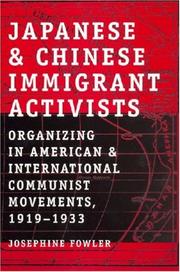| Listing 1 - 10 of 11 | << page >> |
Sort by
|
Book
ISBN: 0816501750 0816541604 Year: 2021 Publisher: University of Arizona Press
Abstract | Keywords | Export | Availability | Bookmark
 Loading...
Loading...Choose an application
- Reference Manager
- EndNote
- RefWorks (Direct export to RefWorks)
This important final report of the War Relocation Authority, written in 1946 and now released in book form with a comprehensive introduction by Edward H. Spicer, describes the growth and changes in the community life and how attitudes of Japanese-American relocatees and WRA administrators evolved, adjusted, and affected one another on political, social, and psychological levels.
Japanese Americans. --- Japanese Americans --- Evacuation and relocation, 1942-1945. --- Evacuation and relocation of Japanese Americans, 1942-1945 --- Internment of Japanese Americans, 1942-1945 --- Relocation of Japanese Americans, 1942-1945 --- World War, 1939-1945 --- Kibei Nisei --- Nisei --- Ethnology --- Japanese --- Evacuation of civilians --- Forced removal of Japanese Americans, 1942-1945 --- Evacuation and relocation, 1942-1945 --- Forced removal of civilians --- Forced removal and internment, 1942-1945. --- Society & culture: general

ISBN: 1559361220 1636701116 Year: 1997 Publisher: New York : Theatre Communications Group,
Abstract | Keywords | Export | Availability | Bookmark
 Loading...
Loading...Choose an application
- Reference Manager
- EndNote
- RefWorks (Direct export to RefWorks)
Japanese Americans --- Girls --- Américains d'origine japonaise --- Filles --- History --- Drama. --- Histoire --- Théâtre

ISBN: 0295974338 0295974176 Year: 1995 Publisher: Seattle : University of Washington Press,
Abstract | Keywords | Export | Availability | Bookmark
 Loading...
Loading...Choose an application
- Reference Manager
- EndNote
- RefWorks (Direct export to RefWorks)
Japanese Americans --- Américains d'origine japonaise --- Drama. --- Théâtre
Book
ISBN: 0190878983 0190878975 0190878959 Year: 2018 Publisher: New York, NY : Oxford University Press,
Abstract | Keywords | Export | Availability | Bookmark
 Loading...
Loading...Choose an application
- Reference Manager
- EndNote
- RefWorks (Direct export to RefWorks)
The national security and civil liberties tensions of the World War II mass Japanese American internment (incarceration) link 9/11 and the 2015 Paris-San Bernardino attacks to the era in America darkened by accelerating discrimination against and intimidation of those asserting rights of freedom of religion, association, and speech, and one marked by increasingly volatile protests against racial and religious discrimination. This text discusses the broad civil liberties challenges posed by these past-into-the-future linkages, highlighting pressing questions about the significance of judicial independence for a constitutional democracy committed both to security and to the rule of law.
Japanese Americans --- Civil rights --- National security --- Legal status, laws, etc. --- Civil rights. --- Evacuation and relocation, 1942-1945. --- Korematsu, Fred, --- Trials, litigation, etc. --- Homeland defense --- Homeland security --- Evacuation and relocation of Japanese Americans, 1942-1945 --- Internment of Japanese Americans, 1942-1945 --- Relocation of Japanese Americans, 1942-1945 --- World War, 1939-1945 --- Kibei Nisei --- Nisei --- Ethnology --- Japanese --- Evacuation of civilians --- Korematsu, Toyosaburo, --- Korematsu, Toy, --- Forced removal of Japanese Americans, 1942-1945 --- Evacuation and relocation, 1942-1945 --- Forced removal of civilians --- Forced removal and internment, 1942-1945.
Book
ISBN: 1461491843 1461491851 Year: 2014 Publisher: New York : Springer,
Abstract | Keywords | Export | Availability | Bookmark
 Loading...
Loading...Choose an application
- Reference Manager
- EndNote
- RefWorks (Direct export to RefWorks)
The Politics of Reparations and Apologies examines the evolution and dynamics of reparation politics and justice. The volume introduces the key concepts, theories, and terms associated with social movements and in particular, the redress and reparation movement (RRM). Drawing from RRMs that have their foundation in World War II--the German genocides, the United States internments, and the Japanese “comfort women” system-- the volume explores each case study’s relative success or failure in achieving its goals and argues that there are overarching trends that can explain success and failure more generally in the RRM movement. Using the backdrop of international criminal law and normative concepts of reparations, the volume establishes and analyzes the roles of reparations and apologies in obtaining transitional justice. In each case study, there is a detailed rundown of the political actions that were attempted to obtain redress and reparation for the victims, of how successful the attempts were, and of the crucial factors which influenced the relative success or failure. Crucially, the volume offers a comparative framework of the actions that contribute to a successful outcome for transitional justice. With the increasing normative expectation of justice in post-conflict situations, this volume is a valuable resource for researchers in international affairs, human rights, political science, and conflict studies.
Holocaust, Jewish (1939-1945) --- Japanese Americans --- Reparations. --- Evacuation and relocation, 1942-1945. --- Evacuation and relocation of Japanese Americans, 1942-1945 --- Internment of Japanese Americans, 1942-1945 --- Relocation of Japanese Americans, 1942-1945 --- Political science. --- International relations. --- Cross-cultural psychology. --- Political Science and International Relations. --- International Relations. --- Cross Cultural Psychology. --- World War, 1939-1945 --- Reparations for historical injustices --- Evacuation of civilians --- Applied psychology. --- Applied psychology --- Psychagogy --- Psychology, Practical --- Social psychotechnics --- Psychology --- Coexistence --- Foreign affairs --- Foreign policy --- Foreign relations --- Global governance --- Interdependence of nations --- International affairs --- Peaceful coexistence --- World order --- National security --- Sovereignty --- World politics --- Cross-cultural psychology --- Ethnic groups --- Ethnic psychology --- Folk-psychology --- Indigenous peoples --- National psychology --- Psychological anthropology --- Psychology, Cross-cultural --- Psychology, Ethnic --- Psychology, National --- Psychology, Racial --- Race psychology --- National characteristics --- Forced removal and internment, 1942-1945. --- Forced removal of Japanese Americans, 1942-1945 --- Evacuation and relocation, 1942-1945 --- Forced removal of civilians
Book
Year: 1945 Publisher: Princeton, N.J. : Princeton University Press,
Abstract | Keywords | Export | Availability | Bookmark
 Loading...
Loading...Choose an application
- Reference Manager
- EndNote
- RefWorks (Direct export to RefWorks)

ISBN: 0226869490 Year: 1971 Publisher: Chicago : University of Chicago Press,
Abstract | Keywords | Export | Availability | Bookmark
 Loading...
Loading...Choose an application
- Reference Manager
- EndNote
- RefWorks (Direct export to RefWorks)
Indians, North American --- Social Sciences --- Socioeconomic Factors --- Interpersonal Relations --- Social sciences --- Japanese Americans --- Indians of North America --- Sciences sociales --- Américains d'origine japonaise --- Indiens d'Amérique --- Fieldwork --- Recherche sur le terrain --- -Behavioral sciences --- Human sciences --- Sciences, Social --- Social science --- Social studies --- Civilization --- Kibei Nisei --- Nisei --- Ethnology --- Japanese --- American aborigines --- American Indians --- First Nations (North America) --- Indians of the United States --- Indigenous peoples --- Native Americans --- North American Indians --- Field work --- -Case studies --- Culture --- Indians of North America. --- Japanese Americans. --- -Field work --- Américains d'origine japonaise --- Indiens d'Amérique --- Social Sciences. --- Socioeconomic Factors. --- Interpersonal Relations. --- Behavioral sciences

ISBN: 9786611092603 0978813543543 1281092606 0813543541 0813540410 0813540402 9780813543543 9781281092601 9780813540405 9780813540412 Year: 2007 Publisher: New Brunswick, N.J. : Rutgers University Press,
Abstract | Keywords | Export | Availability | Bookmark
 Loading...
Loading...Choose an application
- Reference Manager
- EndNote
- RefWorks (Direct export to RefWorks)
Japanese and Chinese immigrants in the United States have traditionally been characterized as hard workers who are hesitant to involve themselves in labor disputes or radical activism. How then does one explain the labor and Communist organizations in the Asian immigrant communities that existed from coast to coast between 1919 and 1933? Their organizers and members have been, until now, largely absent from the history of the American Communist movement. In Japanese and Chinese Immigrant Activists, Josephine Fowler brings us the first in-depth account of Japanese and Chinese immigrant radicalism inside the United States and across the Pacific. Drawing on multilingual correspondence between left-wing and party members and other primary sources, such as records from branches of the Japanese Workers Association and the Chinese Nationalist Party, Fowler shows how pressures from the Comintern for various sub-groups of the party to unite as an “American” working class were met with resistance. The book also challenges longstanding stereotypes about the relationships among the Communist Party in the United States, the Comintern, and the Soviet Party.
Japanese Americans. --- Law. --- Political Science. --- Japanese Americans --- Chinese Americans --- Immigrants --- Politics and government --- Political activity --- Politics and government. --- Communist Party of the United States of America --- History. --- Kibei Nisei --- Nisei --- CPUSA --- Communist Party of the United States --- Kommunisticheskai︠a︡ partii︠a︡ SShA --- Mei-kuo kung chʻan tang --- Communist Party, U.S.A. --- Amerikan Komünist Partisi --- American Communist Party --- Partido Comunista de los Estados Unidos --- KP der USA --- K.P. der U.S.A. --- Kommunistische Partei der USA --- Kommunistische Partei der U.S.A. --- Ḳomunisṭishe parṭey der Fareynigṭe Shṭaṭn --- Communist Party USA --- קאמוניסטישער פארטיי פון די פאראייניקטע שטאטן --- קומוניסטישער פארטיי, פערייניקטע שטאטן --- Yhdysvaltain Kommunistipuolue --- Chinese --- Ethnology --- Japanese --- Workers (Communist) Party of America --- Communist Party of America --- Communist Political Association --- Progressive Labor Movement (Brooklyn, New York, N.Y.)

ISBN: 1349635731 0312295413 0312295391 Year: 2006 Publisher: New York, New York ; Houndmills, Basingstoke, Hampshire, England : Palgrave Macmillan,
Abstract | Keywords | Export | Availability | Bookmark
 Loading...
Loading...Choose an application
- Reference Manager
- EndNote
- RefWorks (Direct export to RefWorks)
In this engaging oral history, residents of California's scenic, sparsely-populated Owens Valley reflect on their varied experiences with the region's turbulent past. Contested themes of Native American removal, water transfers, and wartime internment are interwoven with remembrances of the valley's multicultural communities, its cattle ranching and agriculture, and its Western filmmaking, railroad, and mining enterprises. Together, author and narrators create an accessible and richly textured work of history, memory, and place.
United States-History. --- History, Modern. --- US History. --- Modern History. --- Social Structure, Social Inequality. --- United States --- History. --- Modern history --- World history, Modern --- World history --- United States—History. --- Social structure. --- Social inequality. --- Egalitarianism --- Inequality --- Social equality --- Social inequality --- Political science --- Sociology --- Democracy --- Liberty --- Organization, Social --- Social organization --- Anthropology --- Social institutions --- Manzanar War Relocation Center --- Owens Valley (Calif.) --- History --- Social life and customs --- Ethnic relations --- Manzanar Relocation Center --- United States. --- Manzanā Kyōsei Shūyōjo --- Manzanar (Concentration camp) --- Owens Valley Reception Center --- Owens River Valley (Calif.) --- Japanese Americans --- Interviews --- Oral history. --- Biography --- Forced removal and internment, 1942-1945 --- Conversation --- Interviewing --- Oral biography --- Oral tradition --- Kibei Nisei --- Nisei --- Ethnology --- Japanese --- Methodology

ISBN: 0804744610 0804744629 Year: 2002 Publisher: Stanford, Calif. : Stanford University Press,
Abstract | Keywords | Export | Availability | Bookmark
 Loading...
Loading...Choose an application
- Reference Manager
- EndNote
- RefWorks (Direct export to RefWorks)
Japanese Americans --- Globalization --- Américains d'origine japonaise --- Mondialisation --- Ethnic identity --- Social aspects. --- Identité ethnique --- Aspect social --- America --- Japan --- Amérique --- Japon --- Ethnic relations. --- Relations --- Relations interethniques --- Américains d'origine japonaise --- Identité ethnique --- Amérique --- Japanese --- Ethnology --- Social aspects --- History --- Social conditions --- Americas --- New World --- Western Hemisphere --- Nihon --- Nippon --- Iapōnia --- Zhāpān --- I︠A︡ponii︠a︡ --- Yapan --- Japão --- Japam --- Mư̄ang Yīpun --- Prathēt Yīpun --- Yīpun --- Jih-pen --- Riben --- Government of Japan --- 日本 --- 日本国 --- Nipponkoku --- Nippon-koku --- Nihonkoku --- Nihon-koku --- State of Japan --- Япония --- Japani --- اليابان --- al-Yābān --- يابان --- Yābān --- Japonsko --- Giappone --- Japonia --- Japonya --- Jepun --- Yapon --- Yapon Ulus --- I︠A︡pon --- Япон --- I︠A︡pon Uls --- Япон Улс
| Listing 1 - 10 of 11 | << page >> |
Sort by
|

 Search
Search Feedback
Feedback About UniCat
About UniCat  Help
Help News
News